South Africa, Egypt, and Nigeria possess 56% of Africa’s wealth
Queen Elizabeth’s death could revive Kenya’s Treetops Hotel
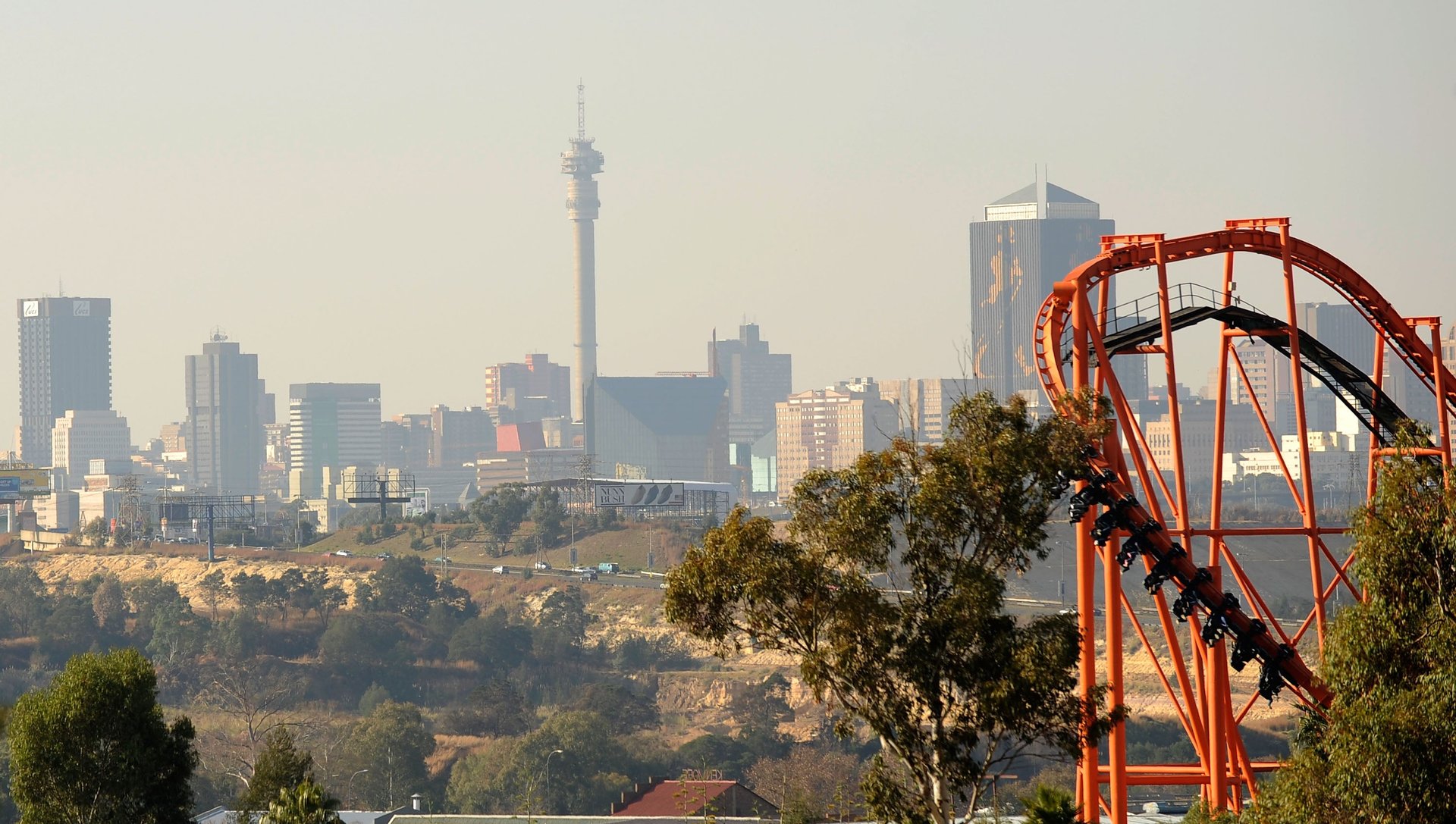
Rich countries are donating more money than ever towards food aid in poorer countries. But that money is a bit like a band-aid that doesn’t heal the underlying wound, billionaire Bill Gates explained to Quartz in an interview this week.
Instead, he said, donors should be much more focused on supporting basic agricultural research. That way, improvements to protect crops from climate change and boost their yield—technology that is now standard-issue in rich countries and for their staples, like corn and wheat—can be adapted to the climate conditions of sub-Saharan Africa and to crops like cassava and yam. “Certainly without better seeds, we are going to fall short,” he said.
It’s not just food security. The world is not on track to meet almost any of the “sustainable development goals” adopted by the UN in 2015, according to a new report by the Bill and Melinda Gates Foundation. Climate change, the pandemic, and the war in Ukraine all threw wrenches in the works, Gates explained. But donor countries are also stuck in outmoded approaches to aid that undervalue the potential impact of local scientific innovation, which requires sustained, long-term investment, he said.
Looking ahead to the COP27 climate summit in Egypt in November, Gates also said the focus by activists and the host country on climate aid finance may be a distraction: “I hope the meeting ends up being a constructive thing, and not just a shrill “where’s-the-money?” thing,” he said.
—Tim McDonnell, Cairo-based climate change and energy correspondent
Keep up with what the United Nations General Assembly does—and doesn’t do—over the next two weeks by signing up for our Need to Know: UNGA 2022 limited email.
What to watch for in the Quartz Africa member brief
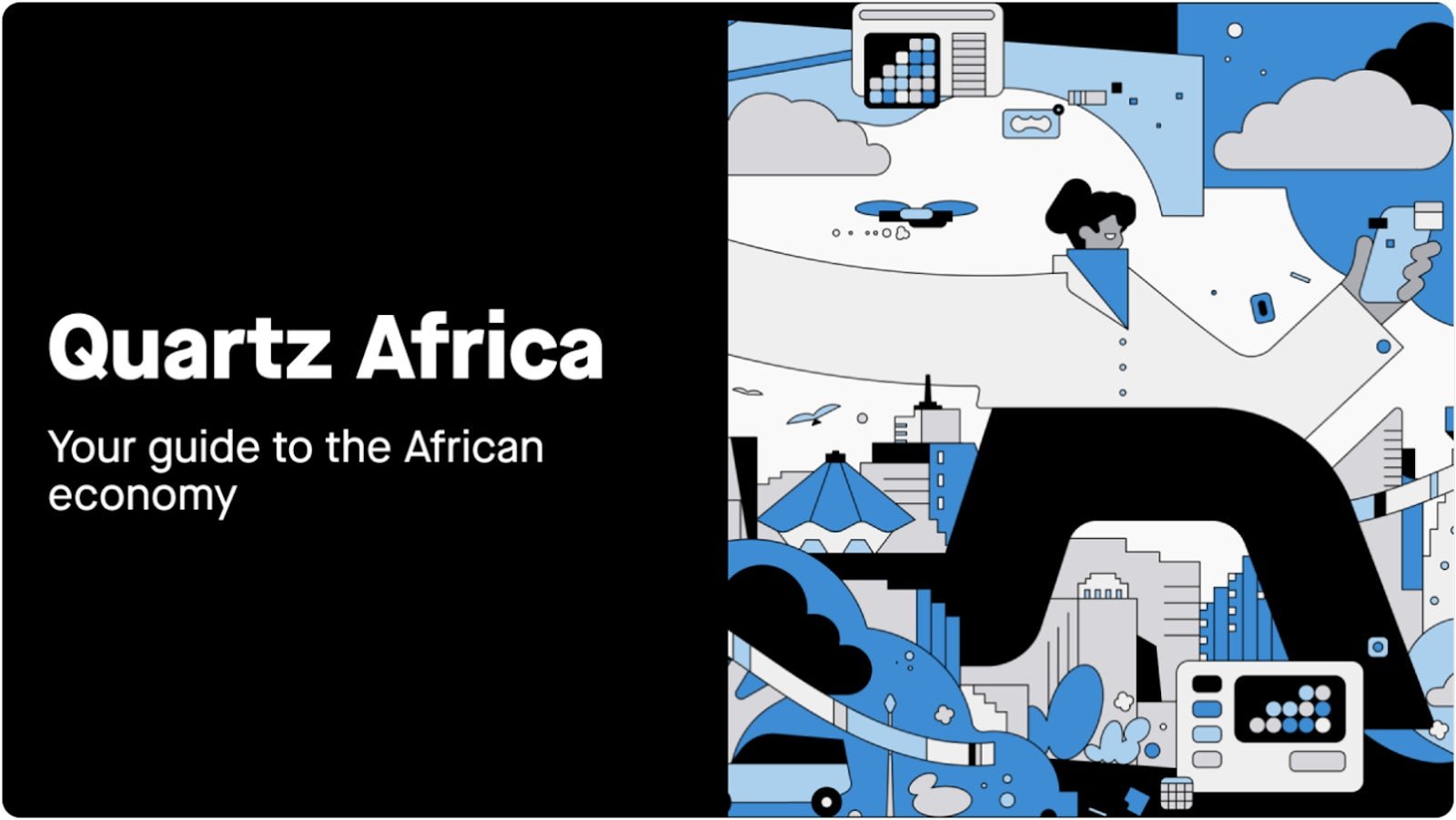
Cheat sheet:
💡 The opportunity: With over 40 million savings and credit cooperative organizations (SACCO) members on the continent, fintech has a huge opportunity to digitize the industry.
🤔 The challenge: Technology comes at a cost, and smaller SACCOs may not be able to afford the high prices that cover the cost of cloud computing and real-time transactions.
🌍 The roadmap: Digitizing operations in the back office of SACCOs is the first step, followed by enabling 24/7 transactions for their members from wherever they are. This leads to digitized payments, remittances, and investments, as well as faster lending with better credit scoring and credit information sharing.
💰 The stakeholders: SACCOs themselves and their members, regulatory bodies, trade and agricultural unions, and other players in the financial sector that want to offer supplementary products to credit union members.
Learn more about Kwara, a Kenya-based digital banking platform for SACCOs, in this coming Wednesday’s edition of the Quartz Africa Member Brief. To get the Member Brief directly in your inbox (and save 40%), become a member today!
Stories this week
Queen Elizabeth II’s death could revive Kenyan hotel where she learned she was queen. Faustine Ngila traveled the 150 km (93 miles) from Nairobi to the Treetops Hotel where a young princess became queen in 1952 only to find covid-19 forced it to close. However, the monarch’s death could reverse the hotel’s fortunes.
A Brazilian fintech unicorn lands in Africa. Alexander Onukwue reports on what the Africa launch of EBANX, a decade-old Brazilian payments processing company operating in 15 Latin American countries, could mean for Africa’s leading fintech players.
Tough times ahead for Kenyans. A subsidy expiring the day after President William Ruto was sworn in caused a sharp rise in fuel prices and electricity costs, Faustine Ngila reports.
African free trade must include women. Liberia’s vice president Jewel Taylor and other leaders emphasized the need to increase African women’s access to finance to enable trade, Alexander Onukwue writes.
The Gambia has a paracetamol problem. Alexander Onukwue explains why the west African country has suspended all sales of the medication’s syrup.
Tech is transforming Egypt’s agriculture. Farmers in southern Egypt are now using a mobile app for weather forecasting and making informed decisions on irrigation and fertilization. Muhammed Kotb explores other projects and tech startups helping farmers boost yields.
Charting the countries holding Africa’s wealth
Three African countries hold more than half of the continent’s total wealth, according to a new report on Africa’s wealth (pdf)
🇿🇦 South Africa: $651 billion
🇪🇬 Egypt: $307 billion
🇳🇬 Nigeria: $228 billion
🌍 Africa in total: $2.1 trillion
Mauritius gets a special mention as “the fastest growing wealth market in Africa in percentage growth terms, with growth of 74% between 2011 and 2021.” The island nation also has the highest wealth per capita in Africa, equivalent to $34,500. Faustine Ngila crunches the numbers of where the continent’s richest people live.
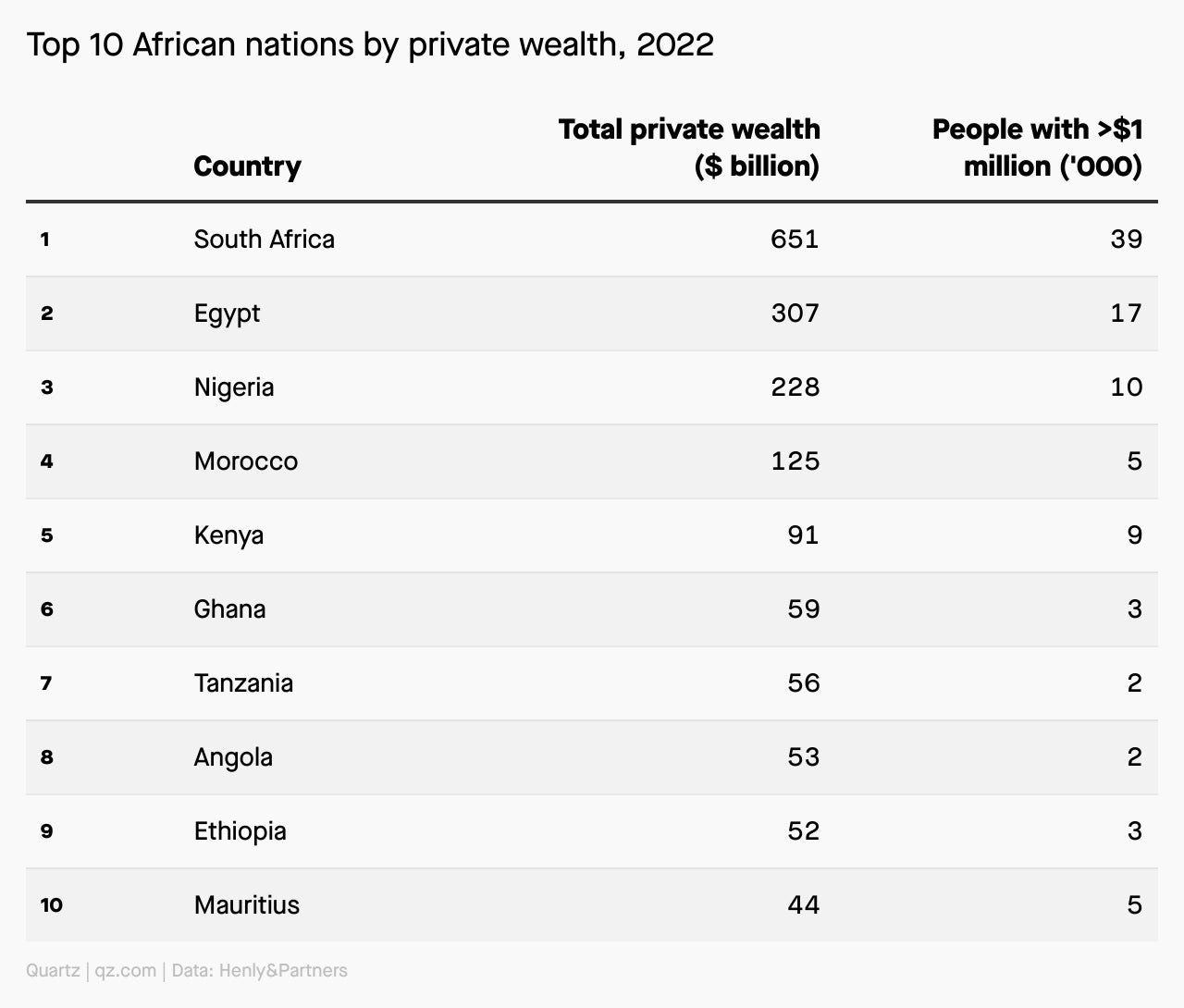
Person of interest
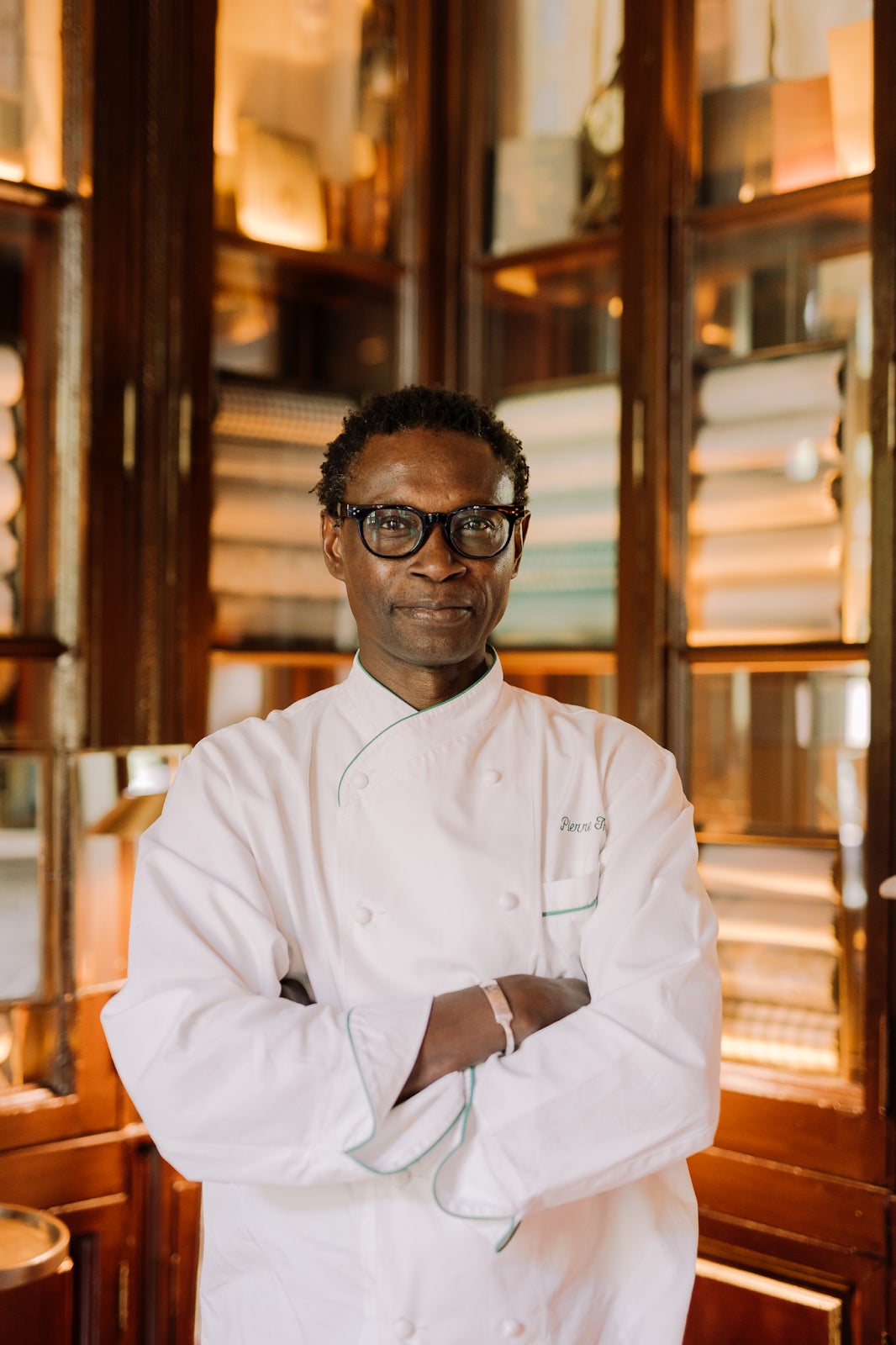
Since touching down in New York City more than 30 years ago from his hometown Dakar, the Senegalese chef, author, and culinary activist, Pierre Thiam, has dedicated his life to introducing a global audience to west African cuisine. In doing so, he hopes to promote a region with a rich food culture, empower local farmers, and challenge long-held perceptions about a part of the world too often linked with negative stereotypes.
He is best known for bringing fonio to the world. Indigenous to the Sahel region that straddles the width of Africa between the Sahara Desert and the Sudanian savanna, fonio is gluten-free, rich in iron and amino acids, can grow in nutrient-poor soil, and requires very little water, which makes it the ideal crop in the fight against climate change.
Meron Demisse reports fonio is only the beginning in Thiam’s much grander mission of elevating the status of African cuisine globally.
Spotlight on a Quartz Africa 2021 Innovator
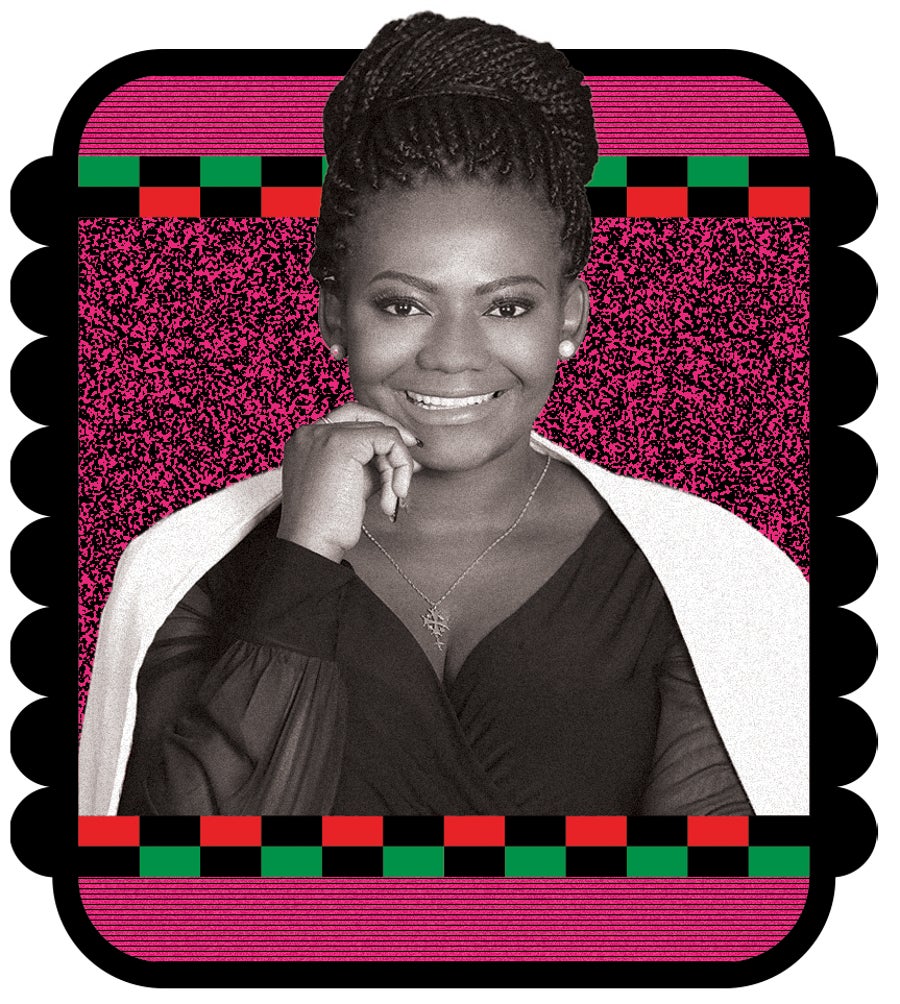
Marie-Alix de Putter is a serial founder, entrepreneur, and storyteller who believes in the great potential of African women. Born in Paris and raised in Cameroon, alongside Cathye Moukoko she is a co-creator of The Sisters Invest, an international network of female business angels, with a central mission to raise investments by women in female-led businesses across Africa.
In addition, De Putter is also the co-founder of organizations that campaign for the destigmatization of mental health in Africa, and support ethical leadership in Cameroon.
She also runs HEMLEY Productions, a content media company which aims to put “women of all walks of life and Africa at the center of every story.”
Check out Quartz Africa’s Innovators 2021 list, which showcases the pioneering work being done by Marie-Alix de Putter and other female African innovators.
Dealmaker
Kippa, a provider of inventory and financial management services for Nigerian small businesses, raised $8.4 million from Goodwater Capital, TEN13 VC, Rocketship VC, Saison Capital, Crestone VC, VentureSouq, Horizon Partners, and Vibe Capital. The funding adds to the $3.2 million Kippa raised in November 2021.
Turaco, a Kenyan startup that provides technology to companies that want to integrate insurance into their products, raised $10 million in a round led by Cathay Africinvest Innovation Fund (CAIF), and Novastar Ventures. The company reports having 268,000 active users on the back of a 300% increase since 2020.
Quartz Gems
HOW WORRIED IS CHINA ABOUT THE TUMBLING YUAN?
The Chinese yuan has dropped 9.5% this year against the US dollar, sliding closer to what some analysts deem as the significant seven-dollar mark. The Fed’s anticipated 75-point rate hike next week could cause the yuan to tumble even further.
One factor behind the yuan’s poor performance is the soaring value of the dollar. Another is China’s ongoing economic woes, from a struggling real estate sector to disruptions caused by its strict zero-covid policy.
So far, Chinese authorities don’t appear too rattled. In a policy briefing last week, Liu Guoqiang, China’s central bank deputy governor, stated: “In the future, the world will continue to enhance the recognition of the renminbi.”
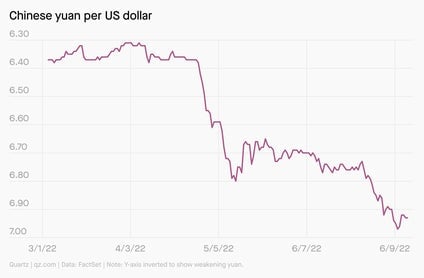
Other things we liked
Tanzania is envious of Kenya’s presidential election. For the BBC, Sammy Awami explains why Tanzanians want their democracy to mature to the level of Kenya, where William Ruto was elected president despite Raila Odinga’s backing by former president Uhuru Kenyatta.
The death toll of Sudan’s summer floods is rising. Since May, floods in Sudan have claimed more than 134 lives and injured more than 120 people, the Associated Press reports.
Angola’s president promises to create jobs. Reuters reports that Angola’s young population feel locked out of the oil-rich nation, despite president Joao Lourenco saying that ending youth unemployment was at the top of his priorities.
Gabon’s president dissolved the country’s infrastructure ministry. For the East African, Ndi Eugene Ndi looks into why president Ali Bongo decided to delist the ministry.
Nigeria’s inflation is at its highest since 2005. For the Guardian Nigeria, Collins Olayinka, Anthony Otaru and Joseph Chibueze explain how a 20.5% inflation rate is hurting the economy—and how it could get even worse.
ICYMI
Apply for ECOWAS internship. Graduates from ECOWAS member states aged under 35 are invited to apply for a 12-month internship program. Benefits include a monthly allowance of $800 if you choose to complete your internship in a country other than your own. (Sept. 28)
BMZ African German Leadership Academy Program 2023 is open. This fully funded program invites applicants aged between 25 and 40 living in Côte d’Ivoire, Senegal, Ghana, Togo, Zambia, Kenya, Ethiopia, Morocco, and Tunisia.
🎵 This brief was produced while listening to ‘Madamu’ by Drama T (Burundi)
This week’s brief took you to 🇰🇪, 🇳🇬, 🇿🇦, 🇨🇲, 🇱🇷, 🇪🇬, 🇹🇿, 🇸🇩, 🇦🇴, 🇬🇦, 🇬🇲 and 🇧🇮
Our best wishes for a productive and ideas-filled week ahead. Please send any news, comments, suggestions, ideas, African dishes, and newly-minted millionaires to [email protected]. You can follow us on Twitter at @qzafrica for updates throughout the day.
If you received this email from a friend or colleague, you can sign up here to receive the Quartz Africa Weekly Brief in your inbox every week. You can also follow Quartz Africa on Facebook.